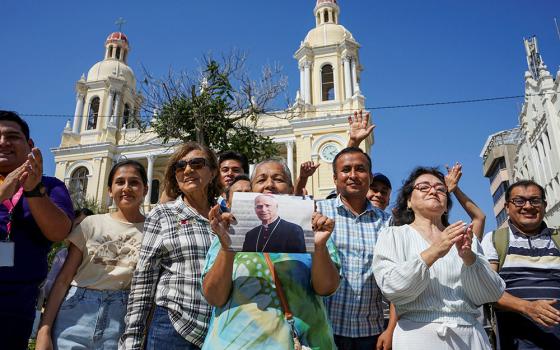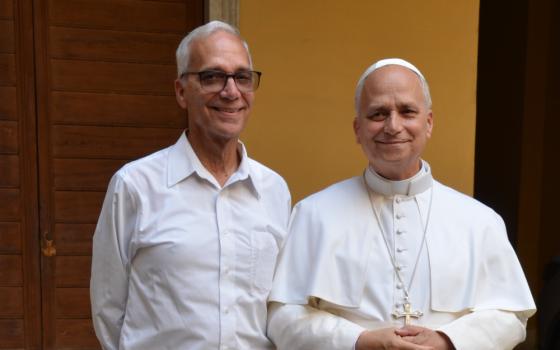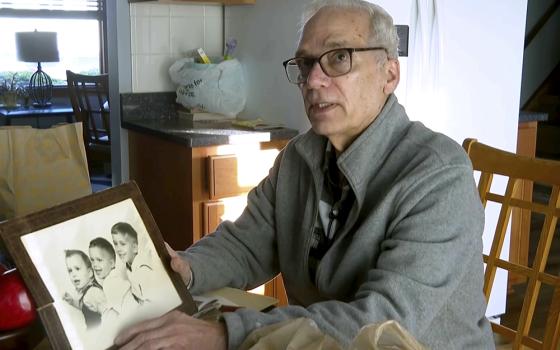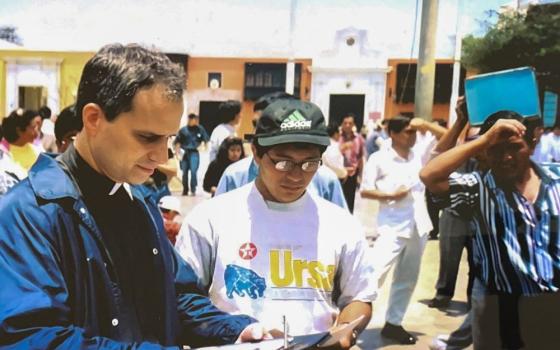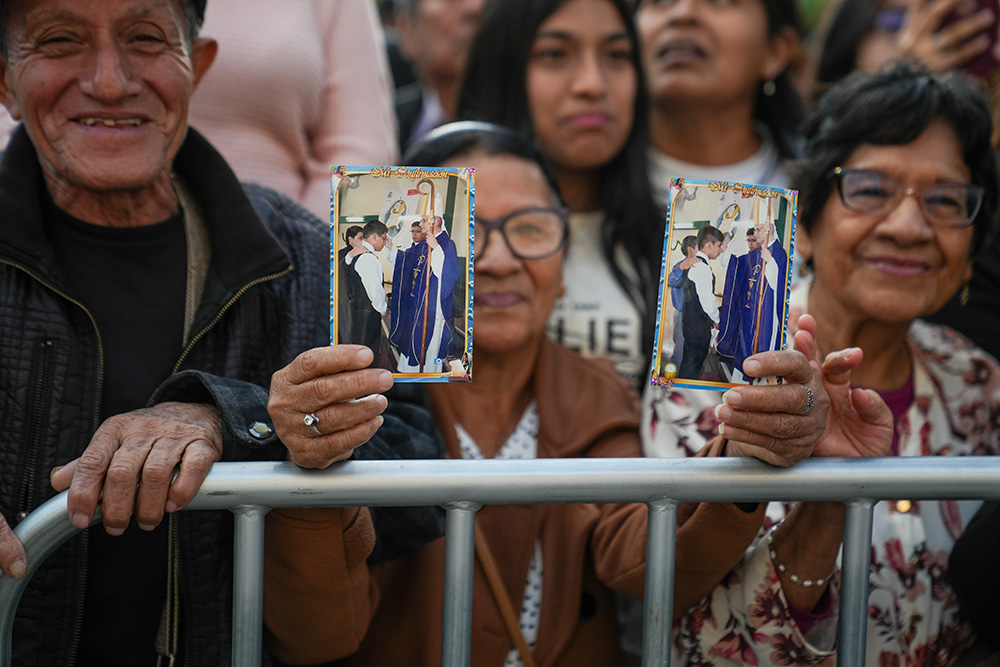
Victoria Herrera, a Chiclayana, holds photos of her grandchildren with Bishop Robert Prevost, during an outdoor Mass in Chiclayo, Peru, on May 10, where thousands prayed for Prevost's success in his new role as Pope Leo XIV. (GSR photo/Manuel Rueda)
Posters of Pope Leo XIV line the main streets of the Peruvian city of Chiclayo, where a life-sized cutout of him sits on the balcony of city hall, waving at pedestrians who pass by the city's main square.
The American pope, who as Bishop Robert Prevost served the Chiclayo Diocese from 2015 to 2023, has become a celebrated figure in this city of half a million people, where he is widely treated as if he had been born here.
Today, locals who knew Leo hope the same "Bishop Roberto," famous for driving around the diocese in a battered pickup truck, will keep his pragmatic and charismatic leadership as Pope Francis' successor as bishop of Rome. Leo was elected to lead the worldwide Catholic Church on May 8.
The picture that emerges from Leo's time in Chiclayo is one of a gregarious pastor who was not afraid to roll up his sleeves and get involved in the community's problems, such as supporting newly arrived migrants and supporting anti-trafficking ministries. He's remembered as a leader who brought religious and secular people together to tackle various issues and spread what Sr. Maria Ramos described as the "love of God."
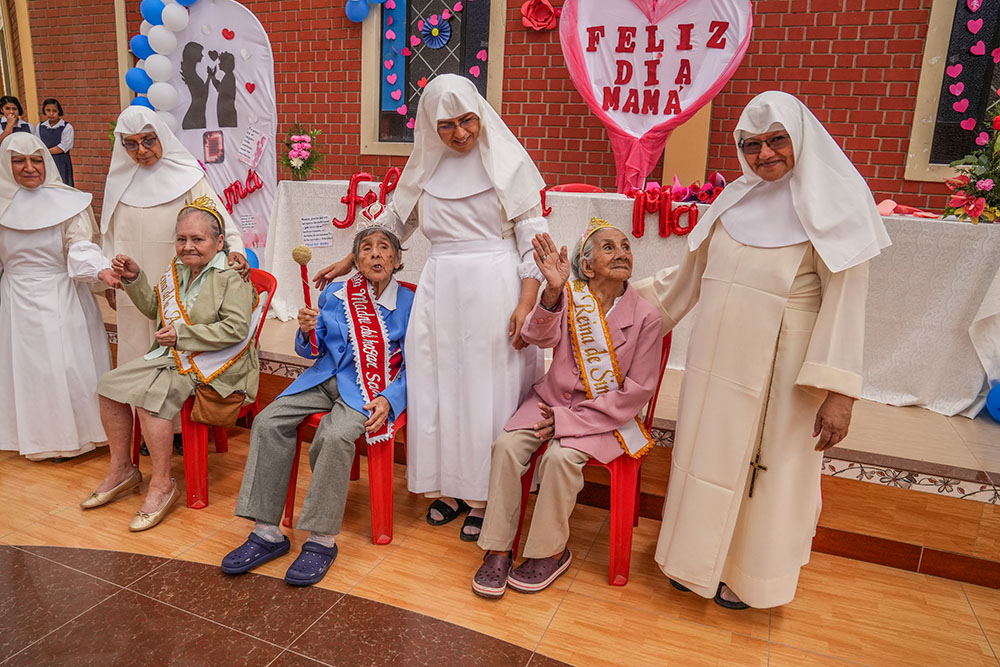
Little Sisters of the Abandoned Elderly (Hermanitas de los Ancianos Desamparados) hold a Mother's Day event for residents of the San José Nursing Home on May 11. Pope Leo XIV would attend these events when he was the bishop of Chiclayo, Peru, and listen to the stories of the residents of this nursing home. (GSR photo/Manuel Rueda)
Chiclayanos treasure their pictures with Prevost, and happily share their anecdotes about his time in this hectic city on Peru's arid northern coast, a region where 20% live in poverty, according to the World Bank.
Ramos recalled how the bishop would visit a home for the elderly run by her congregation — Little Sisters of the Abandoned Elderly — to chat with residents and play the role of "judge" in a mock beauty pageant that included dancing and singing shows.
Betania Rodríguez, a teacher from Venezuela, talked about how the pope encouraged migrants from her country to set up an association that now helps newcomers get residency papers.
Silvia Vásquez, a survivor of human trafficking, said Prevost would visit a house run by the Sisters of the Sacred Sacrament to offer Mass to sex workers who were learning new trades and invite them to spiritual retreats.
Janinna Sesa, an engineer and former director of the local Caritas, said Prevost convinced local businesses to donate tens of thousands of dollars during the pandemic to build two oxygen plants in impoverished neighborhoods, where coronavirus patients could not afford to buy oxygen cylinders.
Now that "Roberto" is Leo, many Chiclayanos are eager to see him carry on the same spirit in Rome that he displayed during his time in the Peruvian city.
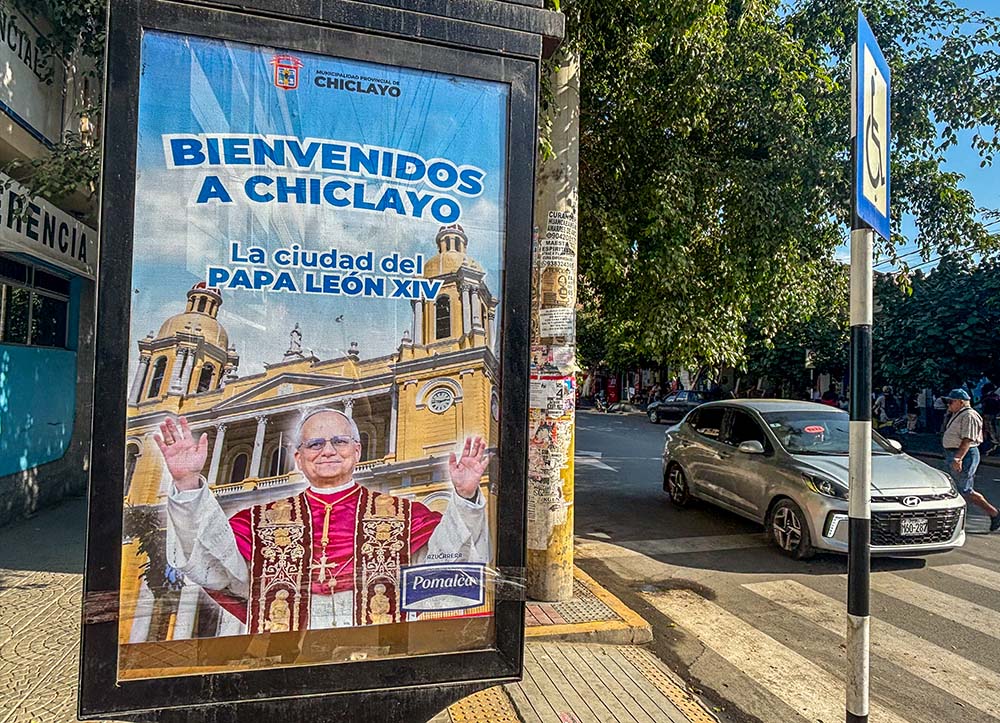
The municipal government of Chiclayo, Peru, has placed posters of Pope Leo XIV in several corners of the city: "Welcome to Chiclayo, the city of Pope Leo XIV." (GSR photo/Manuel Rueda)
"He is someone who will focus on building communities" around different topics, "and delegating responsibilities" said César Piscoya, a Peruvian theologian who worked closely with Leo during his time in Chiclayo.
When the pope was Chiclayo's bishop, Piscoya was the executive secretary of the social vicariate, taking on a role that had previously been reserved to priests.
Piscoya said that, like Francis, Leo is concerned with building a church that tends to those on the margins of society. But he expects his old friend to be more of a "team builder."
"For him, as an Augustinian, communities are the building blocks of pastoral work" Piscoya said. "He believes in the concept of co-responsibility, of clergy and laypeople, working together toward the same goals."
Changing Chiclayo
In 2015, Prevost took over a diocese that had previously been run for six decades by Opus Dei bishops.
Piscoya said that as a bishop, Prevost started to get the diocese more involved in social issues that had been ignored by previous administrations, creating a youth ministry and also a ministry for imprisoned people.
In 2017, when migrants from Venezuela began to arrive in Peru in massive numbers, Prevost asked parishes and congregations within the diocese to work together to provide emergency assistance to the newcomers under an umbrella group known as the Commission for Human Mobility and Human Trafficking.
"Our parks were becoming camps where migrants slept in tents with their children," said Sesa, then the local director of Caritas. "Bishop Prevost asked us to work together so that we could maximize our resources and not send aid to the same places twice."
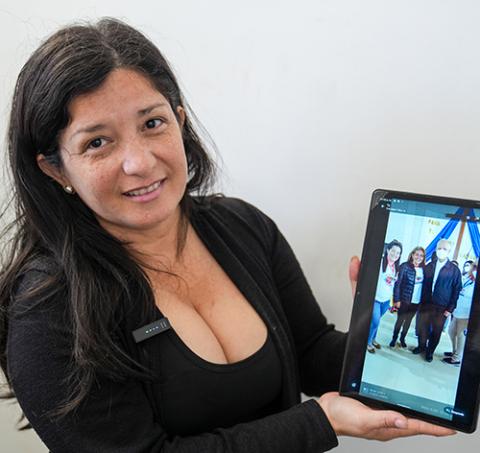
Betania Rodríguez, a teacher from Venezuela, shows a photo of herself and some other Venezuelan migrants with then-Bishop Robert Prevost. Her family lives in a housing project for migrants that was funded partly by the Diocese of Chiclayo, Peru. (GSR photo/Manuel Rueda)
As thousands of migrants with little money and no residency papers passed through Chiclayo, some churches became temporary shelters. The commission also set up food pantries and began to help the migrants who stayed in the city to apply for work permits and residence in Peru.
But Prevost also made an effort to ensure that migrants became involved in their local parishes, said Rodríguez, who is now a volunteer in several church projects that serve her fellow Venezuelan migrants.
"During sermons, he would have us walk up to the altar and would introduce us to the community. ... He would celebrate the International Day of Migrants and would remind locals in sermons that Jesus was a migrant, too."
Rodríguez and several other Venezuelan migrants in Chiclayo have now formed an association called Asovenchi, which helps migrants apply for residency and runs projects for schoolchildren. Her group still works closely with the diocese and local parishes.
"The bishop encouraged us to register our association," Rodriguez said. "And he taught us that human dignity has no frontiers."
As bishop, Prevost also backed efforts to tackle human trafficking.
Sr. Dora Fonseca, of the Handmaids of the Blessed Sacrament, said that Prevost sought regular meetings with her congregation — which focuses on helping victims of prostitution — to learn about the situation of vulnerable women in the diocese.
Advertisement
Prevost then ministered to women who took part in workshops funded by the congregation that teach sex workers and former victims of human trafficking to learn new skills such as sewing or cosmetology.
"He was a bishop who was aware of the realities women go through and was willing to walk with us," Fonseca said.
In 2019 the congregation had to shut down its house in Chiclayo, after Fonseca and some of its other leaders were transferred to Lima.
But Prevost encouraged laypeople who stayed in Chiclayo to carry on with the work of the sisters. He asked members of the congregation to provide the volunteers with online courses on how to approach sex workers and trafficking victims — and also took the online training himself, Fonseca said.
"He was very committed to our cause."
A legacy of diplomacy, friendship
For Fonseca, one of Prevost's greatest talents was his capacity to listen to different groups within the diocese before taking action.
It's a trait that could be useful for the pope as he takes on global issues such as the war in Ukraine, the role of artificial intelligence, or immigration policies, Piscoya said.
Piscoya added that the pope has long been respectful of "institutions" and is likely to work through diplomatic channels — such as bishops' conferences or the Vatican's embassies — when discussing controversial topics with the world's governments.
"He is not someone who seeks confrontation because he knows that does not build unity," Piscoya said. "Before making a decision, he likes to discuss the topic with several parties."
Rodríguez said Prevost would constantly ask migrants how they were being treated in Peru: He encouraged them to form groups within their parishes that would conduct surveys on the needs of migrants and come up with projects that they could propose to Caritas or the diocese's commission.
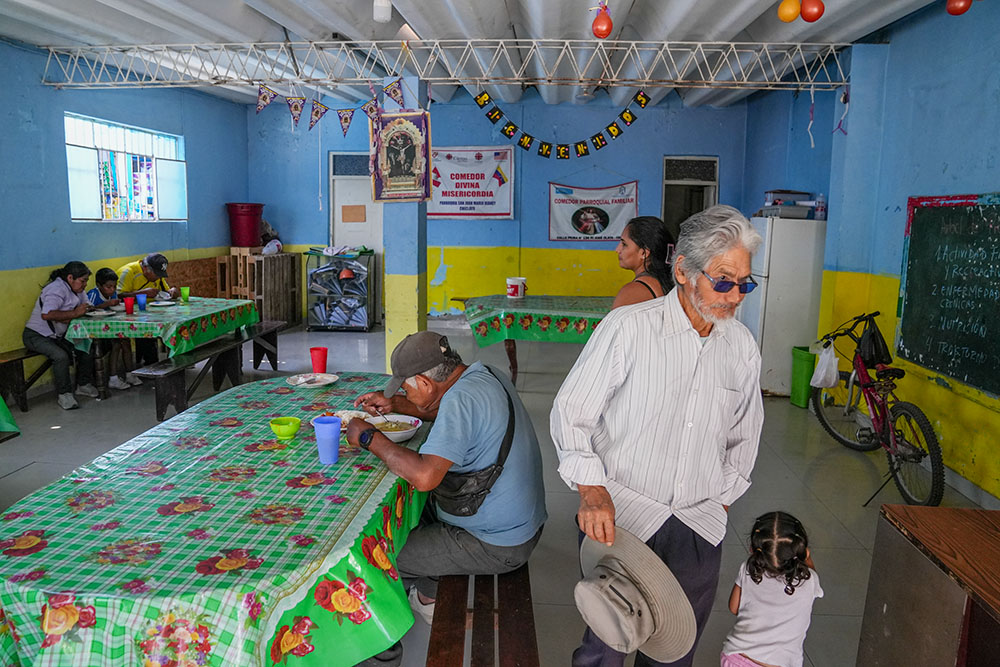
The diocese's Commission for Human Mobility and Human Trafficking set up food pantries that are still open, including the Divine Mercy Eatery near the center of Chiclayo, Peru. (GSR photo/Manuel Rueda)
The process led to the creation of a shelter for short-term stays, as well as projects funded by international donors and executed by Caritas that helped migrants start their own businesses.
Juanita Zunini, a restaurant owner in the town of Lambayeque (within the diocese) said Prevost would enjoy sitting with elderly people and listening to their stories after he offered Mass at the Asilo de Ancianas Hogar San José, the sister-run nursing home in Chiclayo, which he would visit during special festivities like Mother's Day and the congregation's anniversary.
Zunini volunteers at the nursing home. She said she was at the facility delivering food for a Mother's Day celebration on the day that Prevost became Leo XIV.
When the news was announced on television, people broke out in tears, hugged each other, and rang the bells of the nursing home's chapel, Zunini recalled.
"He has left a great legacy of peace, friendship and love" in Chiclayo, the restaurant owner said. "And the fact that he emerged from a poor place like Chiclayo, is sort of mind-blowing."



